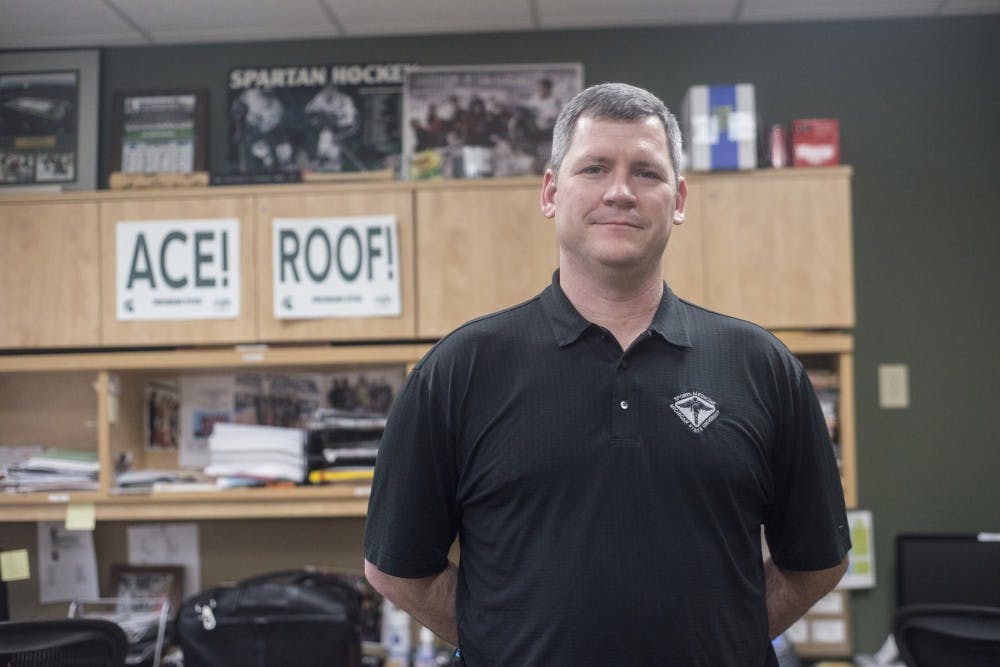This is part four in a series of six stories profiling the MSU Sports Medicine faculty.
The risk of lacerations from skates and falling onto the ice at high speeds makes hockey one of the most susceptible sports to a high rate of injury.
But for MSU’s hockey program, the healing process for players is in good hands with Dr. Andrew Schorfhaar of the MSU Sports Medicine team.
Schorfhaar is entering his ninth year with MSU Sports Medicine. He received his medical school degree from MSU’s College of Osteopathic Medicine and before that he completed his undergraduate degree at Western Michigan University. While attending Western Michigan, Schorfhaar made an important contact in Dr. Jeffrey Kovan, who has evolved from a football trainer for Western Michigan to the director of MSU’s entire sports medicine program.
“Once I came through medical school and did my residency in the Detroit area, I went to Minnesota to do my sports fellowship working with all the professional teams in Minnesota: the Timberwolves, Twins, Vikings and Wild,” Schorfhaar said. “So I just called him (Kovan) on my way out to do that, to let him know where I was at in my career. He said, ‘Before you accept an offer anywhere let me talk to you,’ so I did, and they asked me to come back, so I did.”
Schorfhaar, the team physician for MSU hockey, as well as the team physician for MSU swimming, Lansing Catholic Central High School and the Lansing Lugnuts, works closely with MSU’s hockey trainer, Dave Carrier. Carrier, in his 32nd season with MSU hockey, appreciates Schorfhaar’s cooperation with the team.
“What we like about (Schorfhaar) is he has very good surgical skills, very up-to-date surgical skills,” Carrier said. “Very approachable, and that’s very important from an athletic trainer’s point of view — being able to talk to your doctors and reach them seven days a week.”
Alongside Carrier is Dr. Robert Norris, who shares an office with Schorfhaar at the MSU Sports Medicine facility. Norris is the primary care doctor for MSU hockey and sits on the bench for games. In his 16th year at MSU Sports Medicine, Norris also has a strong working relationship with Schorfhaar.
“I’ve really enjoyed having Andrew come help and be involved, and from the orthopedic perspective, he does a very nice job augmenting what we can’t do when surgery needs to be done,” Norris said. “He has a good relationship with the boys as well. He’s not necessarily there on a day-to-day basis, but from a standpoint of when he is needed he has always been willing to come in off hours to help out.”
After a residency in Minnesota working for all four professional teams in Minneapolis, there is not much the man hasn’t encountered. Schorfhaar explained the unpredictability of medicine, while recounting his most intense surgical memory.
“We see all kinds of interesting stuff, and sometimes it’s pretty straightforward, sometimes it’s pretty gruesome,” Schorfhaar said. “I had someone who was dying of flesh-eating bacteria and I had to cut off their arm, but they lived, so it’s not often you see working in sports someone like that. We see a lot of stuff — there’s not much you can throw at us that we haven’t seen before.”
That gruesome example of the complex cases Schorfhaar handled is just one of many. These MSU surgeons see patients of all types across Michigan. It doesn’t bother Schorfhaar — that’s why he went into medicine in the first place.
“One of the good things about medicine is whoever walks in the door you can take care of,” Schorfhaar said. “And we are lucky to be able to take care of mostly athletes, especially MSU, but we all cover high schools and people from up north and different areas. You take care of a couple people and they start sending people down to you. I think we have a broad reach around the state to bring people into our clinic and that’s what is fun about it.”
Schorfhaar does have a lighter side. Both Carrier and Norris testified to golfing in the summertime with Schorfhaar. However, because both Carrier and Norris have seen what he can do with a knife in the operating room, they declined to comment on his short range game. Good golfer or not, Schorfhaar enjoys the time he spends with his colleagues and attributes this chemistry to the department’s success.
“Working with Dave and with Bob has been the best part of that, and the hockey players are a lot of fun to deal with,” Schorfhaar said. “But the collaboration I have with Dave and Bob is the best part of doing that.”







